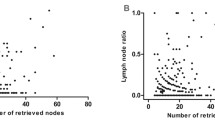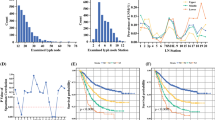Abstract
The revision of the TNM Classification of Malignant Tumors, 7th Edition, suggests the lymph node (LN) status to be the most significant risk factor in esophageal cancer. This article reviews the current status of LNs as indicators of prognosis. The significance of the number of metastatic LNs, the number of resected LNs, and a novel index, the “LN ratio” (metastatic LNs/removed LNs) in patients with esophageal cancer, were reviewed. The number of metastatic LNs independently predicted the prognosis of both overall survival and relapse-free survival. The number of positive LNs was also the best predictive marker of survival. Furthermore, overall survival significantly depended on the number of surgically removed LNs, and the LN ratio closely correlated with survival. The LN status is considered to be the most significant information that can be used to predict the prognosis. However, there are many issues that still need to be resolved. Better knowledge of the N-status is therefore needed to effectively utilize this information. Further research should focus on the N-status of patients with esophageal cancer.
Similar content being viewed by others
References
Zhang HL, Chen LQ, Liu RL, et al. The number of lymph node metastases influences survival and International Union Against Cancer tumor-node-metastasis classification for esophageal squamous cell carcinoma. Dis Esophagus 2010;23(1):53–58.
Kunisaki C, Makino H, Kimura J, et al. Impact of lymph-node metastasis site in patients with thoracic esophageal cancer. J Surg Oncol 2010;101(1):36–42.
Lin CS, Chang SC, Wei YH, et al. Prognostic variables in thoracic esophageal squamous cell carcinoma. Ann Thorac Surg 2009;87(4):1056–1065.
Natsugoe S, Matsumoto M, Okumura H, et al. Prognostic factors in patients with submucosal esophageal cancer. J Gastrointest Surg 2004;8(5):631–635.
Sun K, Zhang R, Zhang D, et al. Prognostic significance of lymph node metastasis in surgical resection of esophageal cancer. Chin Med J (Engl) 1996;109(1):89–92.
Shim YM, Choi YS, Kim K. Prognosis after surgical resection of M1a/M1b esophageal squamous cell carcinoma. J Korean Med Sci 2005;20(2):229–231.
Hsu WH, Hsu PK, Hsieh CC, et al. The metastatic lymph node number and ratio are independent prognostic factors in esophageal cancer. J Gastrointest Surg 2009;13(11):1913–1920.
Liu YP, Ma L, Wang SJ, et al. Prognostic value of lymph node metastases and lymph node ratio in esophageal squamous cell carcinoma. Eur J Surg Oncol 2009;36(2):155–159.
Japanese Society for Esophageal Disease. Japanese classification of esophageal cancer. Tokyo: Kanehara; 2008.
Leslie H. Sobin, Mary K. Gospodarowicz, Christian Wittekind. TNM classification of malignant tumours (UICC International Union Against Cancer). Wiley-Blackwell; 2009.
Edge SB, Byrd DR, Compton CC. AJCC cancer staging manual. 7th ed. Berlin Heidelberg New York: Springer; 2010.
Sobin LH, Wittekind CH. UICC TNM classification of malignant tumor. New York: Wiley; 2002. p. 60–64.
Greene FL, Page DL, Fleming ID. AJCC cancer staging manual. Berlin Heidelberg New York: Springer; 2002.
Urschel JD, Vasan H. A meta-analysis of randomized controlled trials that compared neoadjuvant chemoradiation and surgery to surgery alone for resectable esophageal cancer. Am J Surg 2003;185(6):538–543.
Urschel JD, Vasan H, Blewett CJ. A meta-analysis of randomized controlled trials that compared neoadjuvant chemotherapy and surgery to surgery alone for resectable esophageal cancer. Am J Surg 2002;183(3):274–279.
Burmeister BH, Smithers BM, Gebski V, et al. Surgery alone versus chemoradiotherapy followed by surgery for resectable cancer of the oesophagus: a randomised controlled phase III trial. Lancet Oncol 2005;6(9):659–668.
Gebski V, Burmeister B, Smithers BM, et al. Survival benefits from neoadjuvant chemoradiotherapy or chemotherapy in oesophageal carcinoma: a meta-analysis. Lancet Oncol 2007;8(3):226–234.
Akutsu Y, Matsubara H, Shuto K, et al. Clinical and pathologic evaluation of the effectiveness of neoadjuvant chemoradiation therapy in advanced esophageal cancer patients. World J Surg 2009;33(5):1002–1009.
Donahue JM, Nichols FC, Li Z, et al. Complete pathologic response after neoadjuvant chemoradiotherapy for esophageal cancer is associated with enhanced survival. Ann Thorac Surg 2009;87(2):392–398; discussion 398–9.
Stiles BM, Christos P, Port JL, et al. Predictors of survival in patients with persistent nodal metastases after preoperative chemotherapy for esophageal cancer. J Thorac Cardiovasc Surg 2010;139(2):387–394.
Chirieac LR, Swisher SG, Ajani JA, et al. Posttherapy pathologic stage predicts survival in patients with esophageal carcinoma receiving preoperative chemoradiation. Cancer 2005;103(7):1347–1355.
Schroder W, Baldus SE, Monig SP, et al. Lymph node staging of esophageal squamous cell carcinoma in patients with and without neoadjuvant radiochemotherapy: histomorphologic analysis. World J Surg 2002;26(5):584–587.
Mariette C, Piessen G, Briez N, et al. The number of metastatic lymph nodes and the ratio between metastatic and examined lymph nodes are independent prognostic factors in esophageal cancer regardless of neoadjuvant chemoradiation or lymphadenectomy extent. Ann Surg 2008;247(2):365–371.
Gu Y, Swisher SG, Ajani JA, et al. The number of lymph nodes with metastasis predicts survival in patients with esophageal or esophagogastric junction adenocarcinoma who receive preoperative chemoradiation. Cancer 2006;106(5):1017–1025.
Miyata H, Yamasaki M, Takiguchi S, et al. Pre- and post-therapy nodal status equally affects survival of patients with oesophageal squamous cell carcinoma receiving preoperative chemoradiation. Oncol Rep 2010;23(5):1331–1337.
Nakagawa S, Kanda T, Kosugi S, et al. Recurrence pattern of squamous cell carcinoma of the thoracic esophagus after extended radical esophagectomy with three-field lymphadenectomy. J Am Coll Surg 2004;198(2):205–211.
Ando N, Iizuka T, Ide H, et al. Surgery plus chemotherapy compared with surgery alone for localized squamous cell carcinoma of the thoracic esophagus: a Japan Clinical Oncology Group Study — JCOG9204. J Clin Oncol 2003;21(24):4592–4596.
Tanaka Y, Yoshida K, Sanada Y, et al. Biweekly docetaxel, cisplatin, and 5-fluorouracil (DCF) chemotherapy for advanced esophageal squamous cell carcinoma: a phase I dose-escalation study. Cancer Chemother Pharmacol 2010;66(6):1159–1165.
Igaki H, Kato H, Ando N. A randomized trial of postoperative adjuvant chemotherapy versus neoadjuvant chemotherapy for clinical stage II/III squamous cell carcinoma of esophgus. J Clin Oncol 2008;26 (ASCO Meeting Proceedings Supplement):4510.
Twine CP, Lewis WG, Morgan MA, et al. The assessment of prognosis of surgically resected oesophageal cancer is dependent on the number of lymph nodes examined pathologically. Histopathology 2009;55(1):46–52.
Groth SS, Virnig BA, Whitson BA, et al. Determination of the minimum number of lymph nodes to examine to maximize survival in patients with esophageal carcinoma: data from the Surveillance Epidemiology and End Results database. J Thorac Cardiovasc Surg 2010;139(3):612–620.
Chen YJ, Schultheiss TE, Wong JY, et al. Impact of the number of resected and involved lymph nodes on esophageal cancer survival. J Surg Oncol 2009;100(2):127–132.
Schwarz RE, Smith DD. Clinical impa ct of lymphadenectomy extent in resectable esophageal cancer. J Gastrointest Surg 2007;11(11):1384–1393; discussion 1393–4.
Peyre CG, Hagen JA, DeMeester SR, et al. The number of lymph nodes removed predicts survival in esophageal cancer: an international study on the impact of extent of surgical resection. Ann Surg 2008;248(4):549–556.
Yang HX, Xu Y, Fu JH, et al. An evalua tion of the number of lymph nodes examined and survival for node-negative esophageal carcinoma: data from China. Ann Surg Oncol 2010;17(7):1901–1911.
Altorki NK, Zhou XK, Stiles B, et al. T otal number of resected lymph nodes predicts survival in esophageal cancer. Ann Surg 2008;248(2):221–226.
Bogoevski D, Onken F, Koenig A, et al. I s it time for a new TNM classification in esophageal carcinoma? Ann Surg 2008;247(4):633–641.
Isono K, Sato H, Nakayama K. Results of a nationwide study on the three-field lymph node dissection of esophageal cancer. Oncology 1991;48(5):411–420.
Rizk NP, Venkatraman E, Bains MS, et al. A merican Joint Committee on Cancer staging system does not accurately predict survival in patients receiving multimodality therapy for esophageal adenocarcinoma. J Clin Oncol 2007;25(5):507–512.
Stein HJ, von Rahden BH, Siewert JR. Surviv al after oesophagectomy for cancer of the oesophagus. Langenbecks Arch Surg 2005;390(4):280–285.
Martin DJ, Church NG, Kennedy CW, et al. Doe s systematic 2-field lymphadenectomy for esophageal malignancy offer a survival advantage? Results from 178 consecutive patients. Dis Esophagus 2008;21(7):612–618.
Greenstein AJ, Litle VR, Swanson SJ, et al. P rognostic significance of the number of lymph node metastases in esophageal cancer. J Am Coll Surg 2008;206(2):239–246.
Korst RJ, Rusch VW, Venkatraman E, et al. Prop osed revision of the staging classification for esophageal cancer. J Thorac Cardiovasc Surg 1998;115(3):660–669; discussion 669–70.
Hofstetter W, Correa AM, Bekele N, et al. Propos ed modification of nodal status in AJCC esophageal cancer staging system. Ann Thorac Surg 2007;84(2):365–373; discussion 374–5.
Wilson M, Rosato EL, Chojnacki KA, et al. Prognostic significance of lymph node metastases and ratio in esophageal cancer. J Surg Res 2008;146(1):11–15.
Shimada H, Okazumi S, Matsubara H, et al. Impact of the number and extent of positive lymph nodes in 200 patients with thoracic esophageal squamous cell carcinoma after three-field lymph node dissection. World J Surg 2006;30(8):1441–1449.
Hagen JA, DeMeester SR, Peters JH, et al. Curative r esection for esophageal adenocarcinoma: analysis of 100 en bloc esophagectomies. Ann Surg 2001;234(4):520–530; discussion 530–1.
Christie NA, Rice TW, DeCamp MM, et al. M1a/M1b esopha geal carcinoma: clinical relevance. J Thorac Cardiovasc Surg 1999;118(5):900–907.
Eloubeidi MA, Wallace MB, Hoffman BJ, et al. Predictors of survival for esophageal cancer patients with and without celiac axis lymphadenopathy: impact of staging endosonography. Ann Thorac Surg 2001;72(1):212–219; discussion 219–20.
Rice TW, Blackstone EH, Rybicki LA, et al. Refining esoph ageal cancer staging. J Thorac Cardiovasc Surg 2003;125(5):1103–1113.
Ohtsu A, Boku N, Muro K, et al. Definitive chemoradiothera py for T4 and/or M1 lymph node squamous cell carcinoma of the esophagus. J Clin Oncol 1999;17(9):2915–2921.
Ishida K, Ando N, Yamamoto S, et al. Phase II study of cisp latin and 5-fluorouracil with concurrent radiotherapy in advanced squamous cell carcinoma of the esophagus: a Japan Esophageal Oncology Group (JEOG)/Japan Clinical Oncology Group trial (JCOG9516). Jpn J Clin Oncol 2004;34(10):615–619.
Forshaw MJ, Gossage JA, Chrystal K, et al. Neoadjuvant chemotherapy for locally advanced carcinoma of the lower oesophagus and oesophago-gastric junction. Eur J Surg Oncol 2006;32(10):1114–1118.
Clark GW, Peters JH, Ireland AP, et al. Nodal metastasis and sites of recurrence after en bloc esophagectomy for adenocarcinoma. Ann Thorac Surg 1994;58(3):646–653; discussion 653–4.
Rizk N, Venkatraman E, Park B, et al. The prognostic importance of the number of involved lymph nodes in esophageal cancer: implications for revisions of the American Joint Committee on Cancer staging system. J Thorac Cardiovasc Surg 2006;132(6):1374–1381.
Rice TW, Rusch VW, Ishwaran H, et al. Cancer of the esophagus an d esophagogastric junction: data-driven staging for the seventh edition of the American Joint Committee on Cancer/International Union Against Cancer Cancer staging manuals. Cancer 2010;116(16):3763–3773.
Rice TW, Blackstone EH, Rusch VW. 7th edition of the AJCC cancer staging manual: esophagus and esophagogastric junction. Ann Surg Oncol 2010;17(7):1721–1724.
Nishimaki T, Tanaka O, Ando N, et al. Evaluation of the accuracy of preoperative staging in thoracic esophageal cancer. Ann Thorac Surg 1999;68(6):2059–2064.
Sohda M, Kato H, Suzuki S, et al. (18)F-FAMT-PET is useful for the diagnosis of lymph node metastasis in operable esophageal squamous cell carcinoma. Ann Surg Oncol 2010.
Takizawa K, Matsuda T, Kozu T, et al. Lymph node staging in esophag eal squamous cell carcinoma: a comparative study of endoscopic ultrasonography versus computed tomography. J Gastroenterol Hepatol 2009;24(10):1687–1691.
Sandha GS, Severin D, Postema E, et al. Is positron emission tomogra phy useful in locoregional staging of esophageal cancer? Results of a multidisciplinary initiative comparing CT, positron emission tomography, and EUS. Gastrointest Endosc 2008;67(3):402–409.
Kajiyama Y, Iwanuma Y, Tomita N, et al. Size analysis of lymph node m etastasis in esophageal cancer: diameter distribution and assessment of accuracy of preoperative diagnosis. Esophagus 2006;3:189–195.
Takeno A, Takiguchi S, Yamasaki M, et al. A suspected [18F]fluorodeoxy glucose positron emission tomography-negative metastatic lymph node successfully diagnosed by laparoscopic staging in esophageal cancer: report of two cases. Surg Today 2009;39(10):888–891.
Author information
Authors and Affiliations
Rights and permissions
About this article
Cite this article
Akutsu, Y., Matsubara, H. The significance of lymph node status as a prognostic factor for esophageal cancer. Surg Today 41, 1190–1195 (2011). https://doi.org/10.1007/s00595-011-4542-y
Received:
Accepted:
Published:
Issue Date:
DOI: https://doi.org/10.1007/s00595-011-4542-y




